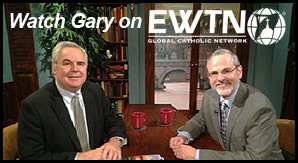The Catechism of the Catholic Church states, ?Through all the words of Sacred Scripture, God speaks only one single Word, his one Utterance in whom he expresses himself completely?. (CCC 102)
Anyone have an idea who that ?Word? is? Here’s a hint…
In the beginning was the Word, and the Word was with God, and the Word was God. He was in the beginning with God. (Jn 1:1-2)
And the Word became flesh and made his dwelling among us, and we saw his glory, the glory as of the Father’s only Son, full of grace and truth. (Jn 1:9)
The ?Word? that is mentioned above, is obviously The Lord Jesus, whose ?becoming flesh? we will celebrate in a few days. For Catholics, the Word of God has both an oral (Sacred Tradition) and written (Sacred Scripture) component. The Vatican II document Dei Verbum states, ?Sacred Tradition and Sacred Scripture form one sacred deposit of the word of God, committed to the Church?. The document goes on to say, ?In order to keep the Gospel forever whole and alive within the Church, the Apostles left bishops as their successors, “handing over” to them “the authority to teach in their own place.” This sacred tradition, therefore, and Sacred Scripture of both the Old and New Testaments are like a mirror in which the pilgrim Church on earth looks at God, from whom she has received everything, until she is brought finally to see Him as He is, face to face (see 1 John 3:2)?.
You can read more about Sacred Tradition here, but today I?d like to discuss the importance of reading Sacred Scripture (The Bible) as part of our plan to learn our Faith and get closer to Christ.
Is it important? According to Dei Verbum:
For holy mother Church, relying on the belief of the Apostles (see John 20:31; 2 Tim. 3:16; 2 Peter 1:19-20, 3:15-16), holds that the books of both the Old and New Testaments in their entirety, with all their parts, are sacred and canonical because written under the inspiration of the Holy Spirit, they have God as their author and have been handed on as such to the Church herself.
The Church has always venerated the divine Scriptures just as she venerates the body of the Lord, since, especially in the sacred liturgy, she unceasingly receives and offers to the faithful the bread of life from the table both of God’s word and of Christ’s body.
For in the sacred books, the Father who is in heaven meets His children with great love and speaks with them.
How about a few quotes from the Saints?
“For ignorance of the Scriptures is ignorance of Christ? (St Jerome ? Commentary on Isaiah)
And let them remember that prayer should accompany the reading of Sacred Scripture, so that God and man may talk together; for “we speak to Him when we pray; we hear Him when we read the divine saying.” (St. Ambrose)
Finally, from the Catechism:
God is the author of Sacred Scripture. “The divinely revealed realities, which are contained and presented in the text of Sacred Scripture, have been written down under the inspiration of the Holy Spirit.” (CCC 105)
The Church “forcefully and specifically exhorts all the Christian faithful . . . to learn ?the surpassing knowledge of Jesus Christ,’ by frequent reading of the divine Scriptures. (CCC 133)
As part of our plan for learning more about the Catholic Faith, we recommend that you read the Bible every day, even if it?s only for 5 or10 minutes. An easy way to do this is to look at the daily Mass readings (available online here). It will only take a few minutes, but will allow God to speak directly to you and guide you on your journey. If one of your closest friends called you on the phone each day, would you answer it? The Creator and God of the universe has something specific to say to each one of us every day?Are you prepared to ?answer the phone? and listen to what He has to say?







